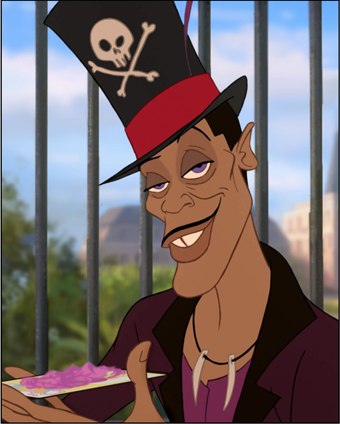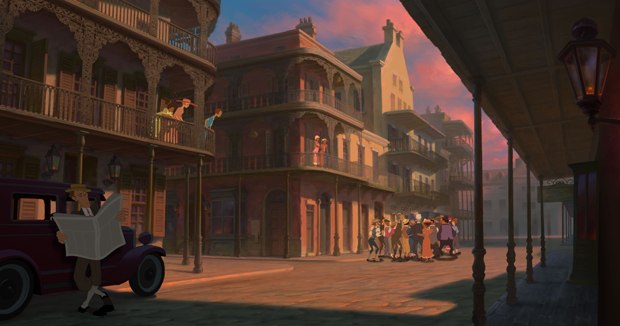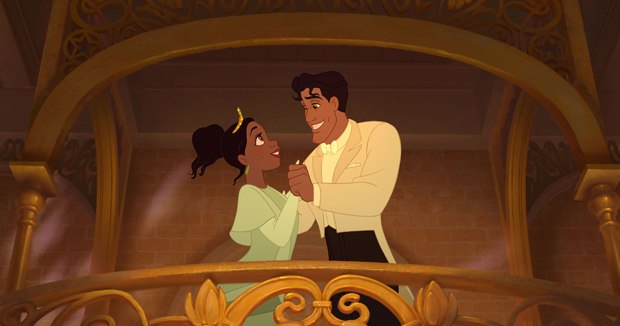Dr. Toon takes on critics for blasting The Princess and the Frog for all the wrong reasons.
Check out The Princess and the Frog in the 2010 AWN Oscar Showcase!

Since the beginning of film there have been critics. The best of them left a legacy of legendary wit, uncanny observation and trend-setting prose. The worst among them miss the point of a film entirely, have no idea how a film is (or isn't) constructed or are blinded by partisan issues that lie entirely outside the film in question.
The vast majority of these, sorry to say, are bloggers. Many of them take their cue from more reputable and established critics and allow themselves to become wannabees who cannot evaluate a film through their own filters and come up with profound thoughts of their own making. Some are more intelligent but not well-versed enough in film theory and criticism. Educated, experienced critics are a treat to read but are vastly outnumbered by amateurs.
Animation fans are particularly susceptible to this disease, since they are genre-based evaluators. To be fair, an animation critic needs different skills than a live-action film critic. For example, no matter what you think of Cary Grant's performance in Arsenic and Old Lace, you don't have to consider whether he was well-drawn or stayed on-model throughout the picture. There is a different set of rules for evaluating animation, making the burden of fair critique a bit more difficult.
This month's essay is really a plea for film criticism to be practiced as an art. Because balanced, thoughtful critique is important to a culture, we have an alternative to postmodern subjectivism, the most incomprehensible, arguably laziest form of critique ever devised.
The Oscar-nominated Disney film The Princess and the Frog provides us with some wonderful examples of what to avoid when evaluating an animated film. There are four areas I would like to address:
Inadequate Attention After one noted critic mentioned in his review that Dr. Facilier seemingly had no motivation for his evil and that the audience never really knew what he wanted, scores of other evaluators jumped in to say the same. Pity that, since Dr. Facilier actually gave us the answers during the film -- twice. Those who watched the movie closely instead of reading someone else's review noted that the bad doctor was in hock up to his skull-and-crossbones to his "friends on the other side." As he begged them for one last shot using Prince Naveen, he was at the supernatural equivalent of being kneecapped or worse. Even earlier in the movie he reminds Lawrence that they will split the LaBouff fortune 60-40. Why did so many people miss this or worse, ignore it?
The answer lies in a genuine flaw that is fair game for criticism. Who was Dr. Facilier? Is his title self-conferred? If he was a real doctor, what did he study? Did it bring him in contact with supernatural forces? Was he somehow chosen by them? Was he once a decent, kind doctor who was manipulated into evil by his dark masters? Why is he in their debt? What reduced him to the lowly level of street magician? Ultimately, all we got was an admittedly terrific villain with no discernable backstory, something the 11 writers could have fixed with a few well-placed lines. This error was the only one worthy of critical focus.
Partisan Agendas After the film came out, several prominent critics of the fundamentalist Right protested the use of voodoo, Obeah, what have you. Some were actually dismayed that Tiana and company sought help from voodoo witch Mama Odie, noting that the Catholic Church was a major player in New Orleans culture. Why didn't Tiana go to the established church fathers? Oh, the timeless idiocy of it. This is a partisan stance voiced only to object to non-Christian beliefs; it has nothing to do with The Princess and the Frog.
Let's think about the structure of this film, since the fundamentalists didn't. First of all, enchantments are an underlying theme in Princess. People don't really turn into frogs, fireflies don't become gaseous balls of hydrogen after they die, traitorous lackeys don't transmute into doppelgangers, vaporous evil masks and voodoo dolls generally don't stage pursuits through city streets. Now let's drag in a reality-based church (or churches) with all their established ritual, protocols, and personnel to play action-hero. We're talking deus ex machina, a surefire way to wreck the plot.
In taking this nonsense further, even if you were a dedicated atheist who equated the Bible with Fantastic Four comic books, you would still have to admit (in a mythological sense) that Jesus and an army of angels would mop up the levees with Facilier. If you were a true fundamentalist, there would be absolutely no doubt of it, and that would be exactly what you would expect the writers to do. In order to have a consistent structure to the movie and provide any sort of suspense, there has to be an even matchup between two supernatural forces that operate on the same terms. Enough said.
'It Wasn't That Way at All' Other critics mentioned that the New Orleans depicted in The Princess and the Frog was a false fantasy of racial integration in which blacks and whites ate together, exchanged pleasantries and occupied the same streets in seeming equality. Although New Orleans may have been more progressive than most Southern cities, the argument goes, this was still a time when inequality between the races was at its height, racism reigned, and interracial disputes were settled with a noose. However things really might have been in the Big Easy, these observations are so peripheral to the story that they are irrelevant. This is a magical fantasy whose background happens to be New Orleans, not a commentary on racial inequity in 1920s Dixie. Taking historical liberties in this case does nothing to add or detract from the plot. Granted, there are films in which the inaccuracies are so egregious -- Don Bluth's ridiculous version of the Russian Revolution in Anastasia comes to mind -- that plot questions are directly generated by such foolery. In the case of Princess it is simply nit-picking of the highest order.
Fantasy Football Follies Ever since Fantasy Football became a national craze, countless fans have equated a player's value by the number of fantasy points the player piles up during a season. There is frequently a disconnect with the reality of what this player actually provides on the field in contributing to a team's success. Among the most common mistakes that some uninformed critics make is equating the value of a film with its box-office take. Since The Princess and the Frog has garnered (at the time of this writing) only $105 million, it's been assumed that the film was a marginal "success" and no great hit with the public. Ignored was the fact that this film, like many others were "Avatarred" (I owe the term to colleagues Tom Reed and Michelle Klein-Hass). This was still a movie nominated for three Oscars and a daring move in itself since it was a 2D flick in a 3-D IMAX universe. Determining the success of this movie by box office gross does it a gargantuan disservice.
Let's see now… Persepolis, Waltz with Bashir, and The Triplets of Belleville amassed a domestic gross of $14 million. The Secret of Kells grossed $40,000 in four days of release. Their combined box office take couldn't have covered the publicity costs for Princess. Do you think screening those films might make for a decent festival? It's a good thing that this is the least common form of poor film evaluation; that's why I put it last.
Let me make this clear: I am not promoting The Princess and the Frog, nor does Disney give a damn what I think of it. It has flaws that are hard to ignore, including problems with consistency. For example, if the film followed its own internal logic, then Charlotte should have been turned into a frog the instant she kissed the Nassim frog for Tiana's sake--but this would have altered the entire climax. On lesser notes, if a crowd flees the Mardi Gras at the sight of a horn-playing alligator in one scene, then they should do so a second time, not accept him as a Dixieland musician in the interests of a Happy Ending. If anyone can tell me why Lawrence was arrested and what he was charged with, I'd be grateful. Impersonating a prince? Aiding and abetting voodoo? More likely, Tying Up Loose Ends With Justice.
What I am talking about is the need for animation critics and would-be critics to either pursue training in, or train themselves, in film theory and analysis. They should have some grounding in animation history. The experience of watching as many animated films as possible, both good and poor, is indispensible. If bandwagon-jumping, unwarranted opinions and uninformed hatchet-wielding are to be avoided, education and experience are vital. So is an all-consuming love for the animated medium.
By this point some readers may consider me to be an insufferable elitist and wish they could cram this essay down my throat. Those with a better voice than mine, and they are many, are welcome to do so. After they do, however, let them carry on their responsibilities to our culture and art. It's the best path to truth.
Dr. Toon presents the following 1980s-educational-post-cartoon message:
A true story: Since the premiere of The Princess and the Frog, doctors nationwide have treated at least 50 cases of Salmonella directly resultant of young girls kissing frogs. There have been no reports of handsome princes generated by these actions. Don't let your little girl join the ranks of the afflicted even if it means shattering the fantasy. Prevent all possible opportunities for frog smooching. Remember, it's not slime, it's mucus. Thank you.
Martin "Dr. Toon" Goodman is a longtime student and fan of animation. He lives in Anderson, Indiana.










